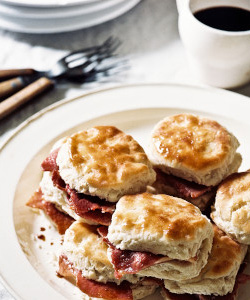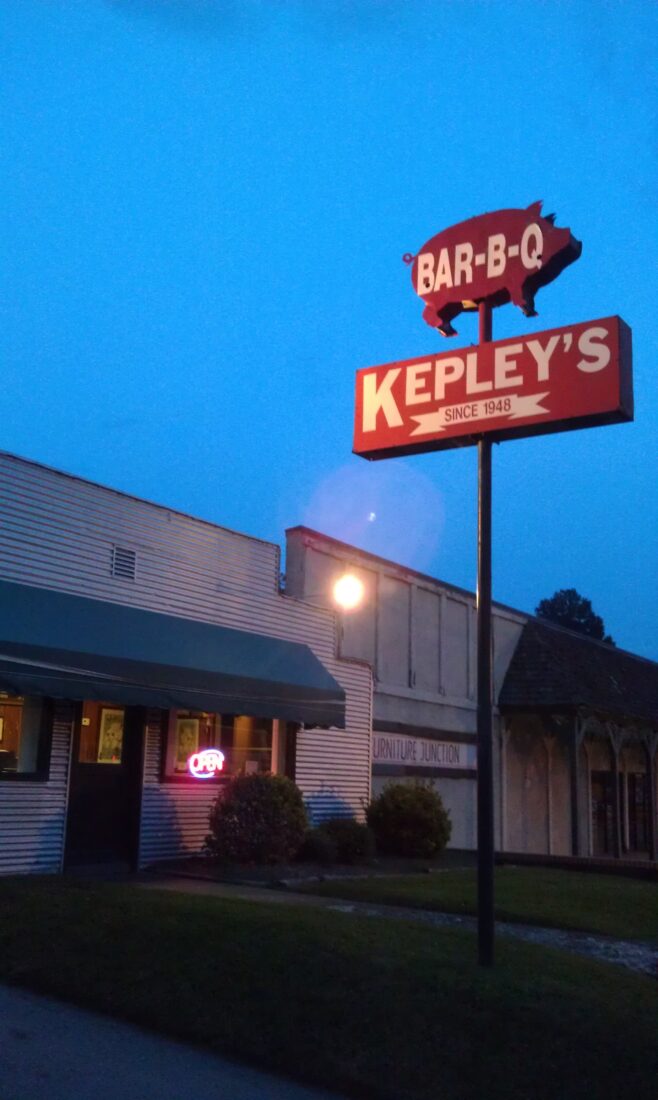Growing up on Hillcrest Drive in High Point, North Carolina, gave me a superpower. We lived right beside the cut-through to Lexington Avenue and Main Street, and from my bedroom, I could monitor not only who was coming and going from Leonard’s Drug Store on their banana-seat Schwinns to load up on Zotz, Hot Tamales, and M&Ms, but also the happenings at Kepley’s Barbecue. On a good (non-windy) day, the mouthwatering smell of wood smoke and slowly roasting pigs wafted through my window, more intoxicating than a Zotz sugar buzz.

Even better, when I walked into Keps, as we affectionately called it, Mr. Bob would look up from the kitchen, cleaver in hand, and call out my name—or at least my family’s name. “Hey Wood! You look just like your daddy,” he’d wink, and toss an extra hushpuppy or two in the sack. “Tell the Doctor hello,” he’d add, and for just three dollars, I’d leave with my pride as well fed as my appetite. That was Bob Burleson’s gift: He made you feel seen.
Burleson began working at Kepley’s at age sixteen, right after his mother died. “We were poor, and I needed a job,” he told WGHP TV in 2019. Since Burleson’s death in 2022 at age ninety, his daughter Susan has run the tiny, iconic restaurant housed in a modified World War II Quonset hut, its exterior comprised of corrugated silver with green awnings, its insides covered in old wood paneling and porcine kitsch.
Founded by Hayden Kepley in 1948, Kepley’s has been a High Point mainstay since before, well, most everything. Before High Point was christened the “Furniture Capital of the World.” Before McDonald’s came to town. Before Krispy Kreme (birthed in neighboring Winston-Salem) lit up their “Hot Now” neon just a block away. Before color TVs and 45 records. Before John Coltrane, a fellow High Pointer, forever changed the history of jazz.
I don’t know if Coltrane ever ate a Kepley’s barbecue sandwich, with its heap of tangy red slaw and a side of warm, crispy, to-die-for hushpuppies, but I do know that Kepley’s and Coltrane shared more than High Point roots. Both had a gift for the sublime and for transporting you to the rare happy place where something pure and stripped of all pretense is simply much better than it has to be.
Sadly, I’m using past tense because Kepley’s, after seventy-seven years of serving vinegary chopped pork and perfectly fried pups, is closing on February 8. It’s the end of an era and a farewell to a time capsule. While the world whirls at 5G speed, the folks at Kepley’s will still—until the last customer on this fateful Saturday—scribble orders on little green Guest Checks and crank open a cash register. The menu, hand-painted on a wooden board, hasn’t changed in decades. Coffee, eighty-five cents, comes with a sincere How ya doing? and free refills.
I’m not claiming Kepley’s is North Carolina’s absolute best BBQ (though, ahem, it is). Lexington Barbecue, just down the way, gets more foodie fame and culinary cred, and that’s cool. Kepley’s is about character. No one at Lexington knows my name, or my family, or that my grandmother preferred the hard-cooked crunchy pork ends. She’d walk into Kepley’s or call ahead and didn’t even have to place an order. And we were far from the only customers made to feel like Kepley’s kin. When my sisters and I brought college boyfriends home, a trip to Kepley’s was their litmus test. After my mother died, Kepley’s was our comfort food.
A hand-written sign behind the counter advertises, “Pigs can fly! We ship anywhere in the USA,” which is as close as Kepley’s got to modernizing. But even that wasn’t about expanding market share or increasing profit. It was just meant to make their devoted customers—people like me, who grew up with vinegar in our veins but had moved away—happy. Which it did.








